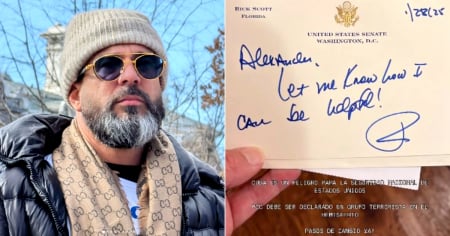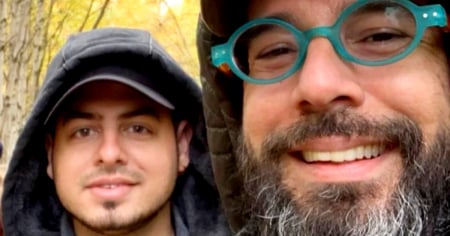The Cuban influencer Alexander Otaola claims that U.S. authorities are investigating between 42,000 and 47,000 alleged cases of fraudulent political asylum applications submitted by Cuban citizens in the last four years.
On February 7, during his program "Hola Ota-Ola," he pointed out that these cases are reviewed carefully to detect irregularities in the documentation and to assess whether the beneficiaries have traveled recently to Cuba, which could raise questions about the legitimacy of their applications.
"There are cases of political asylum for Cubans who have recently arrived and from the last four years, which are under review because authorities are looking for fraudulent documents and beneficiaries of these asylums who have returned to Cuba recently," he stated.
This has been a claim made by many recognized voices in exile who disagree with the use of political asylum as a mechanism to settle in the United States, as some beneficiaries, once they obtain residency, travel on vacation to the island, demonstrating that they are not being persecuted there.
"My dear brothers, when the gathering starts, I don't want any crying. OK? Remember that every action has its consequence. Sometimes it catches you in the moment, and other times you think you have escaped the wrath of Jehovah, but you haven't. Justice catches up with you when you least expect it," Otaola stated during his broadcast.
The influencer also issued a warning to Cubans who have political asylum and are considering traveling to the island. "They may not be able to return," he cautioned.
It refers to the possibility that such travels might be interpreted as evidence that these individuals do not face a real threat in their country of origin, which would contradict the basis of their asylum application.
This announcement coincides with the arrival of the first groups of deported immigrants at the Guantánamo naval base in Cuba, as part of the deportation policy promoted by the Donald Trump Administration.
The Secretary of Homeland Security Kristi Noem stated that "President Trump has been very clear: Guantanamo Bay will house the worst of the worst," reinforcing the policy aimed at incarcerating immigrants accused of serious crimes.
The new detention center being built in Guantánamo will have the capacity to hold 30,000 people. Meanwhile, the Cuban community in the United States is watching with uncertainty the progress of these investigations and their potential repercussions on the lives of a significant number of migrants.
Frequently Asked Questions about the Review of Asylum Applications from Cubans in the U.S.
Why is the U.S. reviewing political asylum applications from Cubans?
The U.S. authorities are investigating approximately 42,000 to 47,000 political asylum applications from Cubans due to suspicions of fraud. Irregularities in the documentation are being sought, and it is being verified whether the applicants have recently traveled to Cuba, which could cast doubt on the validity of their asylum requests.
What consequences do Cubans face with fraudulent asylum applications?
Those Cubans whose applications for political asylum are deemed fraudulent may face the revocation of their status and potential deportation. Traveling back to Cuba after obtaining asylum may be interpreted as a sign that they do not face real danger on the island, which contradicts the basis of their asylum application.
What are the implications of the deportation policy in Guantánamo for Cuban immigrants?
The deportation policy implemented by the Donald Trump administration includes the construction of a new detention center at the Guantanamo Naval Base with a capacity for 30,000 people. This center is intended to house immigrants accused of serious crimes, including those whose asylum applications are deemed fraudulent.
What does Alexander Otaola recommend to Cubans with political asylum who want to travel to Cuba?
Alexander Otaola warns Cubans with political asylum in the United States about the risks of traveling to Cuba. He points out that such trips could be interpreted as evidence that they do not face real danger in their home country, which would contradict the basis of their asylum request and could lead to the revocation of their status.
Filed under:





